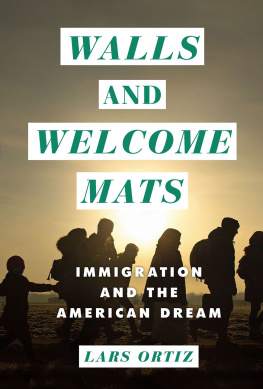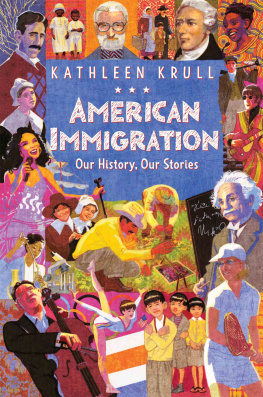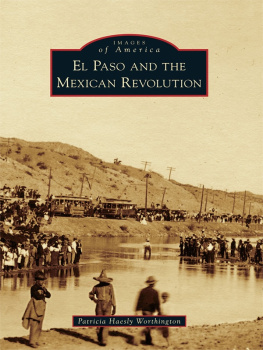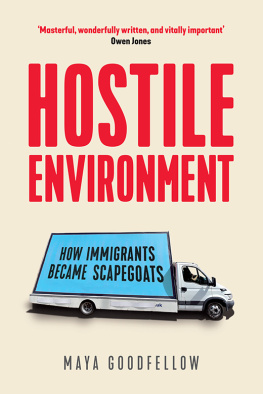Ali Noorani, president and CEO of the National Immigration Forum, an advocacy organization promoting the value of immigrants and immigration, is the author of There Goes the Neighborhood: How Communities Overcome Prejudice and Meet the Challenge of American Immigration.
Noorani is a sought-after commentator, and has been interviewed by the New York Times, the Washington Post, the Economist, the Associated Press, and by several other national, regional, and international media. He is also a frequent guest on a range of television and radio shows, including MSNBC, the Lou Dobbs Show, the Bill OReilly Show, the Sean Hannity Show, Washington Journal, PBS Newshour, Fusion, NPR (the Diane Rehm Show, On Point, and Marketplace), and is an op-ed contributor to CNN.com, FoxNewsLatino.com, among others. Noorani is a regular guest on local talk radio shows across the country. He resides in Washington, DC.
www.alinoorani.org
twitter: @anoorani
insta: @alinoorani
F ollowing trips to Honduras, Arizona, and Texas in the Fall of 2019, Crossing Borders was going to take me to London, Cairo, and Belgrade as I aimed to knit together the stories, the data, and the policies that have come to define the U.S. immigration debate. Yet, once COVID-19 froze those of us who were not essential in our tracks, Crossing Borders became less about reporting on the ground and more about learning from afar. It also became a project that relied on a wide range of friends, experts, and colleagues.
First, a sincere thank you to the Board and Staff of the National Immigration Forum. Our chair, Becky Tallent, has been a wonderful leader of the Forum and a supportive friend. The Forums executive leadership of Don Lyster, Dawn Byrne, and Beth Sears created the organizational space for me to complete the project. And, from policy to communications to the field, I depended on the Forum staffs expertise in so many ways.
My agent, Diane Stockwell of Globo Libros Literary Management, was critical in helping shape Crossing Borders, reviewing drafts along the way and finding a publishing home at Rowman & Littlefield. Which is where I worked with the supportive and creative team of Jon Sisk and Elaine McGarraugh to finalize the manuscript and get it out the door.
Of course, Crossing Borders would have never seen the light of day if it wasnt for the help of Nora Feely, friend, colleague, editor, and an amazing writer in her own right. We have worked together for more years than she would like to admit.
Given the barrage of immigration issues during the Trump administration, the time to develop Crossing Borders was hard to come by. That is until Jonathan Plutzik and Deborah Briggs of The Betsy Hotel on South Beach offered me a stay at their Writers Room. More than offering a space to think and write, Jonathan and Deborah are true friends and supporters of literature and art that carries on their fathers legacy.
The good people of Arizona State University helped in so many ways. In addition to President Michael Crowe, Jos Cardenas, Jim OBrien, and Derrick Anderson, valuable resources were unlocked. One of which was Phd student Clint Reiswig, who helped on a variety of research tasks. And, as we introduce Crossing Borders to readers, it is an honor to work with Bryan Brayboy and Jessica Solymon as fellows at the Arizona State University Social Transformation Lab.
Likewise, through the Emerson Collectives Dial Fellowship, led by Amy Low and Patrick DArcy, I had the time to develop the ideas and stories behind Crossing Borders and connect with so many remarkable leaders along the way. In fact, my personal connection to Honduras began with an Emerson Collective trip to the country organized by Emily Mendrala and Maria Espinosa of the Center for Democracy in the Americas.
While there, I met Kurt Ver Beek and Jo Ann Van Engen, co-founders of the Association for a More Just Society. Kurt and Jo Ann, along with their colleagues Comfort Sampong, Jill Stoltzfus, and so many others, were instrumental in my efforts to learn more about Honduras. Jo Ann was a wonderful travel companion to the coffee highlands, and Angel Muoz offered expert translation services while I was in Tegucigalpa.
In my travels, El Paso became one of my favorite cities in the United States. Bishop Mark Seitz has taught me so much about the city and the region, and Sami DiPasquale of Abara Frontiers was incredibly generous with his time and contacts. Edith Tapia was a fountain of information.
As Crossing Borders moved overseas, one of the first people I asked for help was Jen Smyers, then with Church World Service. Her colleague, Steve Weaver, made introductions to partners in Belgrade and Cairo. And, over at the International Rescue Committee, Nazanin Ash and Hans Van de Weerd from their leadership team were key resources. Wendy Young and her expert team at Kids in Need of Defense shared their expertise any time I asked. And Michelle Mittelstadt of the Migration Policy Institute offered help at a key moment.
Moving back stateside to find innovative solutions, it is hard to overstate how much I have learned from Bri Stensrud, Tess Clarke, and Jenny Yang. Three remarkable, courageous, women work to welcome immigrants to communities weary of immigration. Alongside these three, Matt Soerens and Tim King were experts that I came to depend on at nearly every turn.
In Idaho, the Naerebout family is legendary for their generosity and kindness. And the Idaho dairymen are a special lot. A particular thank you to the soft-spoken Jim Jones, former state attorney general, for his lifetime of public service leadership and sharing the story of the Minidoka Concentration Camp in the Idaho high desert.
A few states to the east, the amazing people of Iowa introduced me to the past, present, and future of Americas heartland. Erica Johnson of the Iowa Migrant Movement for Justice provided a foundation of knowledge that guided every conversation thereafter. Mark Prosser opened the doors to Storm Lake, and Di Daniels helped arrange so many important conversationsincluding an opportunity to learn how to cook pozole. Storm Lake is truly a special place.
Over the course of writing Crossing Borders, there were times I was ready to pull the plug. Or at least ask for yet another extension. In these moments, whether or not they realized it, so many friends and colleagues encouraged me to forge ahead. At the risk of missing a name, a thank you to Chandler Morse, Amanda Ripley, Russell Moore, Elizabeth Neumann, Craig Regelbrugge, Stewart Bunn, Felicia Wong, Travis Wussow, Alan Gomez, Gabe Gonzalez, Ruth Lopez, Marissa Graciosa, David Brotherton, Todd Schulte, Mark Espinoza, Tim King, Eric Smith, Jarrett Barrios, Herbie Ziskend, Scott Friedman, Amy Dominguez-Arms, Laura Reiff, Billy Moore, Kyle Simpson, Helen DuBois, Larry Kleinman, Jeanne Butterfield, Jennie OHagan, Shirley Hoogstra, and so many more.
My parents, Amjad and Najma, along with my sisters, Zeba and Farah, and their families (hello Aysha, Aziza and Zenaya!), are sources of support and inspiration every single day. And, finally, over the course of writing Crossing Borders I met and married (!) the beautiful, brilliant and lovely Toya Gavin. I cannot wait for the life we will live together.
50 Women You Should Know. Christianity Today, October 19, 2012. Accessed April 23, 2021. https://www.christianitytoday.com/ct/2012/october/50-women-you-should-know.html.
1975 Flashback: Evacuation of Saigon. CBS Evening News. YouTube Video. 3:25, April 29, 2015. https://youtu.be/G1xuTJqZ20M.
1979 Special Report: Vietnamese Boat People. CBS Reports. YouTube Video, 48:59, January 19, 1979. https://www.youtube.com/watch?v=_pl3Y9Mv9h0.





